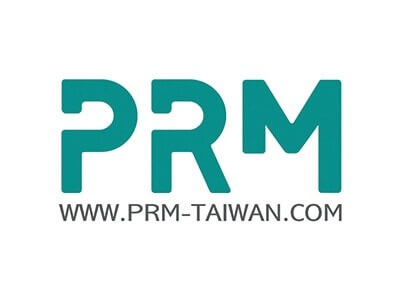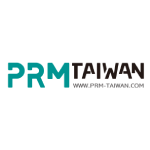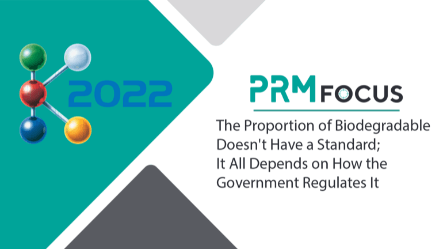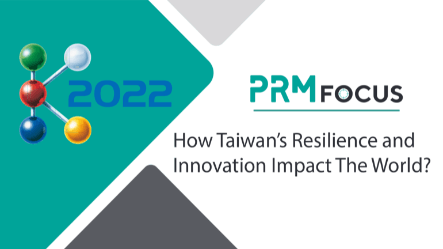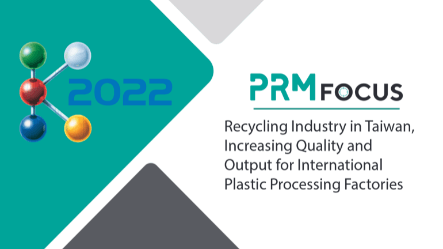Taiwan Machinery Industry Positioned to Lead the World Supply Chain
Since the 2019 K-Show until now, in just three years, the situation around the world has changed dramatically due to the outbreak pandemic. However, people are getting used to this unique circumstance. Including supply chains disconnected from the global economy. Even if the pandemic ends in the future, there will still be some uncertain factors such as geopolitics, trade war, and climate change. No one can guarantee the “broken supply chain” will not happen again. In the early stage of the pandemic, Taiwan successfully managed the situation and gained some buffer. This led Taiwan to become a trusted supply chain partner all over the world! The recycling industry is especially outstanding! From PIR to PCR, Taiwan's recycling technology is highly appreciated by global buyers.
Many crises and situations came out one by one in the nearly three years which people would never have thought. In 2021, under the impact of container, labor, and material shortage or port congestion, even the soaring in freight and raw material. Suppliers often face the threat of chain disconnection. When the Russian-Ukrainian war broke out in early 2022, Europe immediately suffered an energy supply crisis. The crude oil’s price tangled up and down, then falling below 100 dollars per barrel again. The simultaneous depreciation of the euro and the yen brings out the risk of currency volatility. The instability of currencies and energy has made countries around the world feel pressured in the economic situation.
By the end of August, the Fed has made four quick lift rates to slow down inflation, the range is raised by 2.25 percent points. Europe and the United States experienced negative economic growth in the first half of the year. China has also dragged down its economic rate due to the Zero-covid policy, supply chain problems, and the tension with the West. Every country brought out its monetary policy and tried to ease its distress. Stephen Roach, who served as chair of Morgan Stanley Asia. “We’ll have a recession as the lagged impacts of this major monetary tightening start to kick in,” Roach told CNBC’s “Fast Money”
K 2022 releases three major topics: showing the current common problems of global enterprises
In late October, K 2022 held in Düsseldorf pre-announced three major themes: Circular economy, Climate protection, and Digitalization. The circular economy is a topic raised by K 2019, the exhibition this year will show the result of 3 year’s brewing. After the efforts of various countries, the circular economy has developed many concrete and executable solutions. This year, the heat wave crashed Europe and led to catastrophic fires in several countries. Europe is suffering the worst drought in 500years. Brazil, Bangladesh, and Pakistan have been flooded by torrential rains one after another, causing human and economic losses. It’s not hard to understand why the K show must make climate protection a key topic.

As a member of the plastic and rubber industry, we can try our best to reduce carbon emissions. From implementing a circular economy, and using recycled materials to avoiding incineration, to balancing the carbon dioxide generated by plastic products. Moreover, we can utilize artificial intelligence to exert the value of reducing carbon emissions. Digitalization is the specific implementation of industry 4.0. It combines AI data, IoT, automation, iCloud services, digital factory, and communication. These incredible technologies promote a new production system. These three trends released by K 2022 are being implemented in all countries, not only in the plastic and rubber industry but have also become a goal pursued by all industries. Above all, Taiwan is not excluded.
Two Taiwanese enterprises crossover, demonstrating the new model of the circular economy.
Taiwan has continued to make efforts to promote the circular economy, not only with government support but also private enterprises are actively moving towards this target. In terms of the recycling rate, Taiwan’s strength has become a solid foundation, and Taiwan's recycling equipment and recycling technology are also to be admired. Not only that, Taiwan's plastic and rubber equipment manufacturers are also working together to bring out a new model of resource recycling through industrial strategic alliances.
Fu Chun Shin and Polystar machinery are both excellent equipment manufacturers in Taiwan's plastics and rubber industry. FCS is a professional injection molding machine manufacturer. It has a wide range of horizontal injection molding equipment. It has always been committed to development in injection molding and exploring the possibility of cooperation with domains. Polystar Machinery is well-known in the industries of recycling machines. With mastery in recycling machine and film-blowing machine technology, coupled with bold international marketing strategies, it quickly ranks among the world's largest recycling machine manufacturers. A certain proportion of plastic waste will be generated in the injection molding production process. Most manufacturers have different sizes and shapes after crushing recycling plastic waste, which cannot produce a homogenization effect with new materials. Not only is it easy to scratch the screw and the barrel, but it also affects the quality of the finished product. Under Polystar’s equipment, the plastic waste in the injection molding process can be effectively crushed and then put into the plastic recycling machine, which can convert the plastic waste into recycled granules with stable quality. The size and quality of the regenerated particles are almost identical to the original material. Their collaboration doesn't stop here. In food packaging, composite printing films are now widely used. However, composite printing film is difficult to recycle because of its complex composition and heavy printed.
Polystar has upgraded the structure design of the exhaust and filter unit of the extrusion system of the machine so that the high printing ink pressure and moisture can be properly discharged. This technique makes the final recycled particles have a solid and stable shape. This type of recycled particles can be reused in the injection molding machine to remanufacture products with stable quality, such as PP tables and chairs, chemical containers, trash cans, and other products that are widely used in staple merchandise. We believe that the cooperation between such excellent manufacturers will promote the circular economy to another new level. In the future, there will be more successful cases of different resource recycling, making earth sustainability a truly implementable solution.
Taiwan 2050, targeting net zero carbon emission, we will do our best for climate protection!
Facing the action plans proposed by various countries on climate change, Taiwan has always gotten with time and put forward the goal of net-zero carbon emissions by 2050. In the plastics and rubber industry, raw materials play a crucial role in carbon emissions. The Plastics Center proposes the "GRASS Green" to assist Taiwan's raw material manufacturers to develop Green energy, material Recycle, Advance composite, Smart material, and Safe medical equipment. In recent years, many raw material manufacturers in Taiwan have worked hard to convert marine waste into recycled materials, and have even obtained GRS certification and can provide a complete PCR recycling source resume. Rebornplas Composites and Jean Cherng enterprise are representative manufacturers of recycling discarded fishing nets into recycled materials. There is also Taiwan's most famous PCR recycling company, Da Fon Environmental Protection Co, which continues to cooperate with others to explore the recycling of a large amount of waste into new products, so that plastic can be a perpetual cycle. In terms of production equipment, clients are facing a demand for a large number of biodegradable materials. Many film-blowing machine manufacturers in Taiwan have invested and developed the technique very early, and have successfully built equipment that can blow films from biodegradable materials.
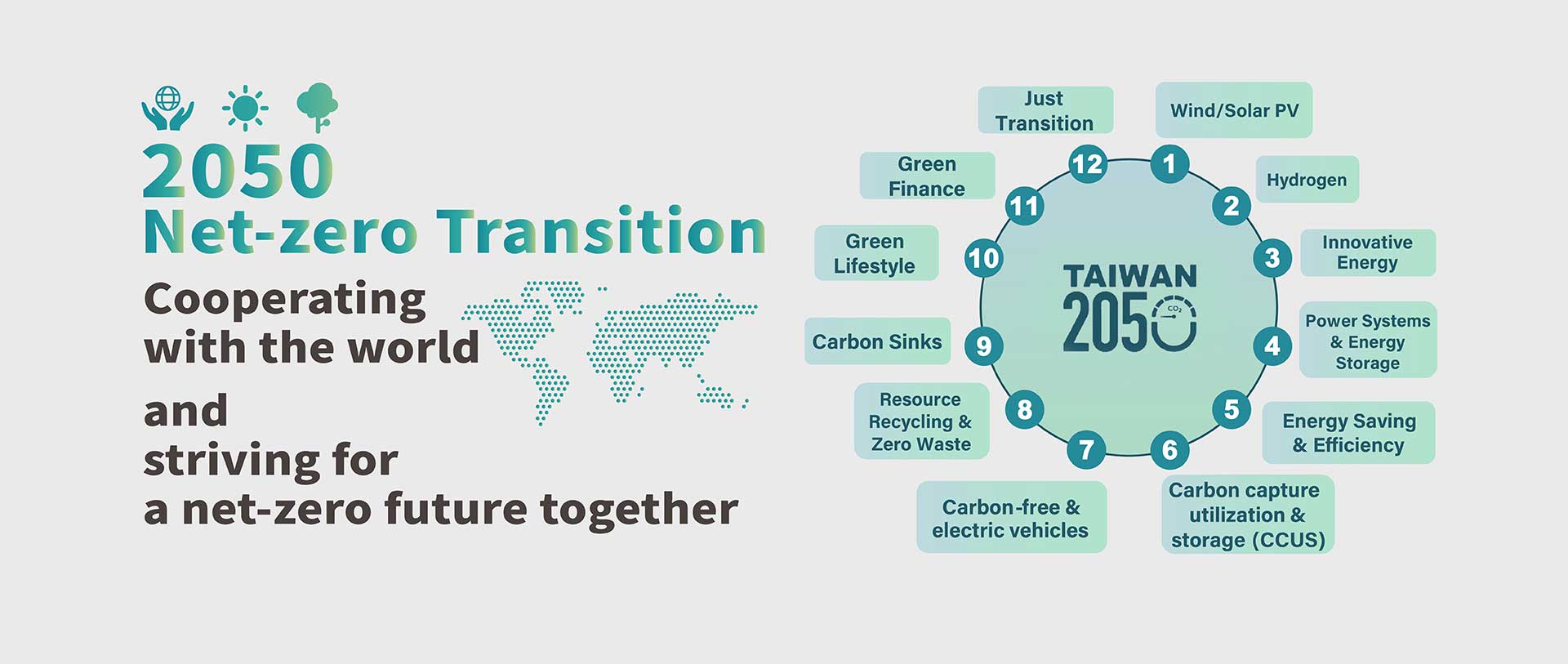
Source:https://www.ndc.gov.tw/en/
Kung Hsing is a leading manufacturer of blown film machinery in Taiwan. It has been requested for biodegradable materials by clients 20 years ago. At that time, the technique of using biodegradable materials on blown film had not been developed yet. However, Kung Hsing has successfully designed and manufactured film-blowing machines for biodegradable materials for customers with rich technical experience. Another manufacturer, Jandi’s, also has insight into the application trend of biodegradable materials in film-blowing machines. Over the years, it has customized film-blowing machines for biodegradable materials for global customers, and even integrates printing, recycling, auto packaging, and bag making, creating a biodegradable five-in-one machine.
SmartManufacturing has become the key to Taiwan's new competitiveness!
"Smart manufacturing" has been one of the Taiwanese government's focused projects to support enterprises in the past years. According to the Taiwanese Department of Industrial Technology from the Ministry of Economic Affairs, in the past five years, the general robotic industry in Taiwan has grown to generate over 131.5 billion NTD a year, with a growth rate of nearly 27%. Taiwan is ranked among the top ten countries with the highest degree of industrial automation in the world by the International Federation of Robotics (IFR).
Taiwanese plastic and rubber manufacturers are actively adopting and promoting automated production lines, from the collaboration between supportive robots and employees to improve production capacity and stabilize quality, to connecting various production lines through the internet. Collecting data into a centralized situation room, making the management of production more efficient, and allowing owners and managers to quickly respond to possible issues and adjustments, thus making the delivery time more predictable and accurate.
Smart manufacturing is also the most critical competitiveness for Taiwan to become a key supplier across the globe.
In terms of plastic and rubber equipment, Taiwanese manufacturers are actively working with customers in research and development to improve further and upgrade the automatization of the production process, which reduces the cost of labor and improves productivity and the quality of the product.
HCI (HCI Converting Equipment Co., Ltd) is an excellent slitting machine manufacturer in Taiwan and has earned the trust of international customers in the design and manufacture of slitting machines and rewinding machines. Recently, they have assisted a professional filter equipment manufacturer to successfully automate part of their production process from an old manual process.
This filter equipment manufacturer specializes in producing corrugated composite core materials for axial air filters, an air filter that is mainly used in automobile engines. This air filter is uncommonly an oval shape product, which greatly increases the difficulties in the rewinding process. This is because the traditional rewinders are round, and it is almost unheard of to be able to achieve oval shape finished products, let alone gluing process during rewinding. When the set length is reached, it needs to be automatically cut at the end of the material. Moreover, the end must also stop at a specific location on the finished product in order to make this specific oval shape.
The old order collapsed, yet the new order is far from established
In response to rapid changes along with various crises, manufacturing industries around the world have adopted many different operational strategies, the most significant and urgent of which is the restructuring and management of supply chains.
In the past, under the tide of globalization, Toyota's lean management emphasized cost-oriented "Just in time", especially in the elimination of cost spent on inventories and increased cash flow. However, under the issue of the shortage of cabinets and the port congestion after the epidemic, the production chain has been disconnected due to a lack of materials, and enterprises have begun to turn to risk management-oriented "Just in case".
On the other hand, it is almost impossible for production operations to be self-sufficient without relying on the global supply chain, so risk assessment and control are necessary investments: how to obtain raw materials from multiple sources of supply, search and trial of alternative raw materials, and dispatching of spare capacity, construction of cross-border real estate lines, etc. In the post-pandemic world, where the old order has collapsed and the new order is still unclear, the production layout must take into account globalization and regionalization. From centralized long-chain to decentralized short-chain of production, companies need to consider multiple "Plan B". Only by seeking suppliers from different countries and not putting eggs in the same basket can you truly minimize the risks.
However, the derived risk costs cannot be passed on to the sales of products and consumers. How to actuarially and quantify risk costs to make better decisions is a topic that enterprises cannot ignore.
Taiwan provides the world with a "strong yet flexible green supply ecological chain"
Taiwan's manufacturing industry has developed a good industrial foundation with complete infrastructure in the past 60 years. Not only has MIT's reputation for quality been polished, but also a complete and flexible supply chain has been cultivated, and a rich industrial ecosystem has been shaped with decades of commitment.
Taiwan's plastic and rubber industry is based on machinery and equipment exportation. Spanning the petrochemical industry of plastic and rubber raw materials, the export of manufactured products and semi-finished products, including molds and peripheral automation components, many of which are made from many large and small processing plants, forming a complete supply chain.
In the early days of the Covid-19 outbreak in 2020, Taiwan was able to respond quickly and precisely to contain and control the virus relatively well, because of its experience with SARS. This gave the Taiwanese companies a longer buffer time to react to the issue of supply chains being disrupted during the first quarter of 2020, which allowed Taiwan to step up and became a backup for the global supply chain.
Small and medium-sized Taiwanese enterprises have flourished in recent years, thanks to the flexible and adaptable characteristics of Taiwanese people. In addition, these Taiwanese enterprises have developed international marketing earlier than other competing companies, thus acquiring keen and rich international experience. They successfully polished the reputation of Made in Taiwan, and nowadays MIT represents excellent quality, prompt service, and sophisticated technology. Not to mention that their prices are always reasonable, which gave Taiwan a place in the global market in the past and furthermore in the future.
From the statistics perspective, Taiwan's exports have still gradually increased since the epidemic and even hit a record high of 26.3% in 2021. It was not until April 2022 that export orders slowed down. However, from January to July this year, Taiwan's cumulative total export orders still increased by 7.8% compared with the same period last year.
In recent years, in response to the international ESG trend, Taiwanese companies have been actively thinking about how to proceed "green transition", whether it is in materials, processes, products, factories, or personnel education, they have proposed numerous implementable plans, and set net-zero carbon reduction as the final goals.
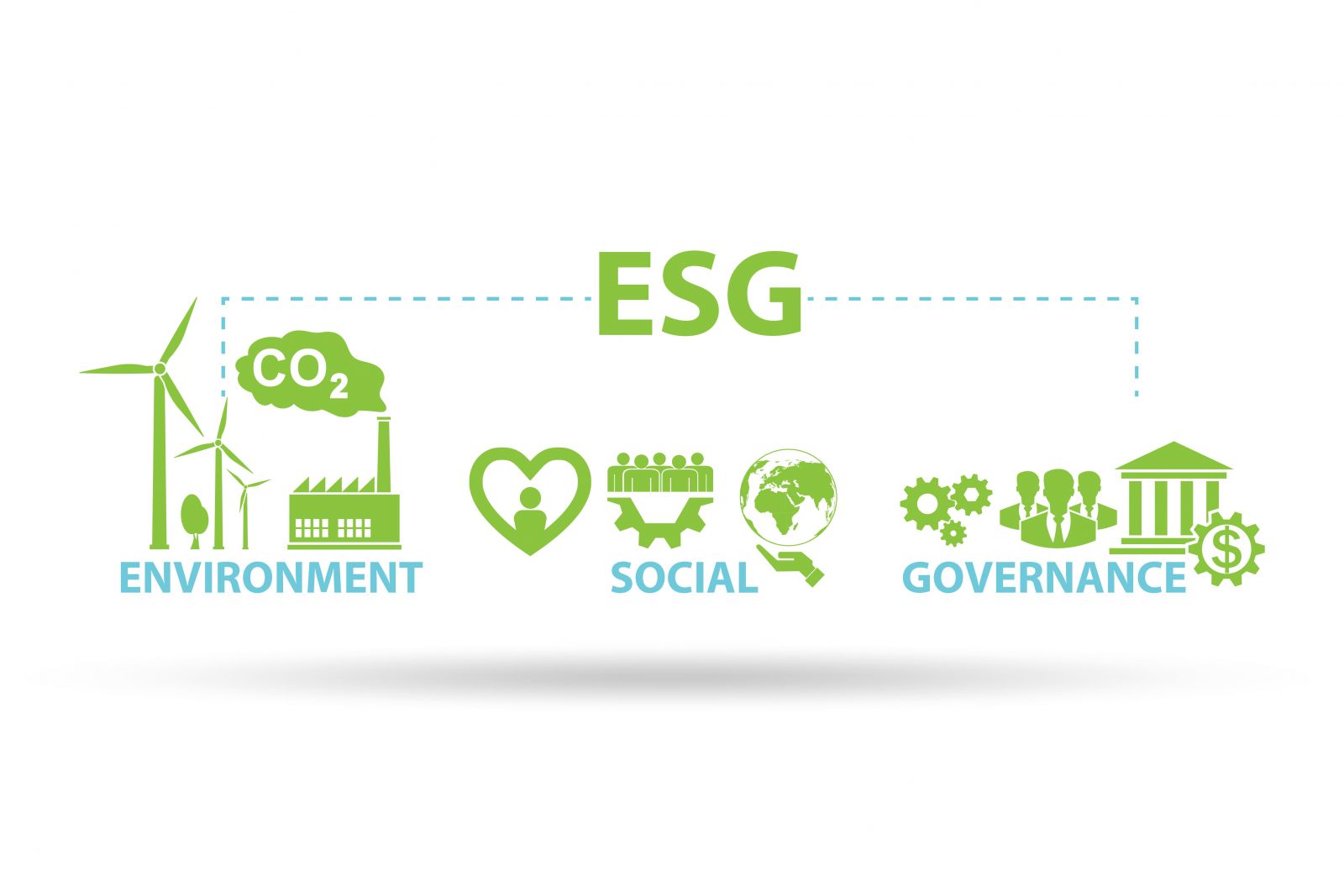
Source: https://euroview.ecct.com.tw/category-inside.php?id=996
For instance, Boretech, a resource recycling company, uses modular units to reduce physical spaces required by the equipment and reduce energy consumption to achieve ESG goals of energy saving and carbon reduction.
As an international PET bottle recycling expert, Boretech is capable of independently developing, designing, and manufacturing PET bottle recycling and cleaning equipment. So far, they have completed and exported more than 200 production lines to over 40 countries. This year, they have improved themselves and upgraded the original recycling and cleaning equipment, which reduced the use of cleaning water by 50%. Moreover, Boretech’s products are highly automated, which is more stable, more efficient, and improves general quality and productivity. The modular design greatly reduces the space required for the equipment by 1/3, which not only reduces the footprint but also reduces energy consumption.
This demonstrates that Taiwan's green manufacturing is booming, through the efforts and contributions of different fields, Taiwan can and will provide a complete and resilient green supply chain for the world.
At the moment, although the global epidemic has yet to be over, it is believed to be under control. All countries are working hard to restore business order and the economy that was hit hard-hit by the epidemic. With the hopeful smooth exhibition of K 2022, signaling an end of the outraging epidemic, it is believed by many that this public health crisis will soon be over.
PRM Media is an exhibition special issue launched by PRM-TAIWAN.com, we bring more supplier information to global buyers in an O2O mode. Other than reading the paper copies on your hand, we also provide you QRcode that connects to our rich content that covers more on B2B platforms.
We look forward to your meeting with more high-quality suppliers through our special issue and the online theme exhibition hall to help your business to a higher level!
We have over 200 of the biggest and many of the smallest Taiwanese machinery manufacturers on our site and contacts with many more. Whether you are looking for full lines such as, recycling machines extruders, blow molding machines, injection molding machines and printing machines, or auxiliary equipment and parts such as gearboxes, barrels, screws, molds, dies, control systems and virtually anything related to the plastic and rubber industries including packaging. If it’s made in Taiwan, we will find it for you!

